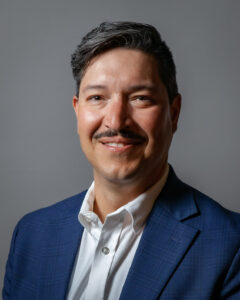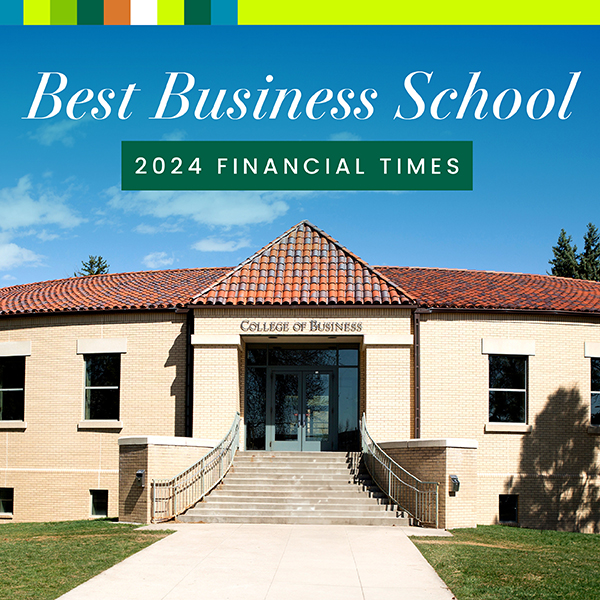 The job of chief sustainability officer at the city of Fort Collins is about more than just being green. In the role, Jacob Castillo oversees the city’s environmental initiatives as well as its economic development programs and social services.
The job of chief sustainability officer at the city of Fort Collins is about more than just being green. In the role, Jacob Castillo oversees the city’s environmental initiatives as well as its economic development programs and social services.
“It’s like, ‘Figure out the climate crisis, solve the housing crisis, address homelessness and keep the economy going in a way that works for everyone,’” Castillo joked. “It’s a pretty tall order, but that’s what we get to do on a daily basis.”
The city developed its approach to sustainability with the triple bottom line of people, planet and profit in mind – a framework with which Castillo is deeply familiar as a graduate of the College of Business’ Impact MBA program.
Many cities now have an employee dedicated to sustainability, but the way in which Fort Collins’ chief sustainability officer role is structured – with the city’s environmental, social and economic programs housed under it – is rare, Castillo said. It allows for integrated solutions and, he believes, greater community impact.
“I don’t know any other community in the U.S. who’s set up the way we are now,” Castillo said. “Our holistic approach really puts us at the forefront of how we’re thinking about solutions, rather than compartmentalizing it as just environmental, social or economic.”
It also allows Castillo to identify areas where the city’s goals might be in tension with one another – such as economic goals conflicting with environmental goals – and work through any conflicts to build harmony.
“The beauty is really where you find the harmony and the intersectional solutions that support a thriving economy, a healthy environment and, of course, the social fabrics that undergird both of those,” he said.
From economic development work to entrepreneurship
As an undergraduate student at Colorado State University, Castillo triple-majored in agricultural business, Spanish and economics and planned to go into international development. But by the time he graduated in 2002, he had fallen in love with the Fort Collins community, prompting him to begin a career in local economic development.
Shortly after graduation, he joined the Northern Colorado Economic Development Corporation as an intern, and over the next five years, he worked his way up to vice president of the organization.
“I got to work with business leaders across the region, and I had a lot of great mentorship, but ultimately, I still had some academic and professional endeavors that I wanted to pursue,” Castillo said.
Just as he had begun to consider what was next for him, the College of Business launched its Impact MBA program. When Castillo learned the degree would focus on “using business theory to make positive social or environmental change in the world,” he knew he needed to enroll.
“I was like, ‘Bingo! That’s exactly what I want to do,” he said. “The timing was perfect, so I applied and got into the first cohort.”
He pursued the Impact MBA while also earning a master’s degree in agricultural and resource economics from the College of Agricultural Sciences.
While in graduate school, he also founded two companies.
“One was a bamboo bicycle manufacturing company called Panda Bicycles, and the other was a clean technology distribution company working in South America called Power Mundo – we were headquartered here but had a subsidiary in Lima, Peru,” Castillo said.
His motivation to start the companies came in part from his upbringing: His parents were both entrepreneurs, so he grew up with an interest in running his own firm. But he was also inspired to use business to build a better world.
“Through the work I did in economic development, getting to know and meet business owners from around the community, I saw the impact that that could have – and then the work in the College of Business further solidified that in synthesizing how business could be a force for good in the world,” Castillo said. “I was like, ‘Wow, through business ownership, business thinking, business modeling, we can make the world a better place.’ It was a really attractive proposition to me.”
Working ‘in service to the community’
After earning his master’s degrees in 2010, Castillo ran both businesses for several years, but he quickly realized he wanted to return to a role that allowed him to have a direct impact on his Northern Colorado community. So, in 2012, he took a job as director of Larimer County’s newly formed economic development department.
Castillo worked for Larimer County for more than 10 years, and over time, his role evolved to include overseeing workforce development programs in addition to economic development. The job allowed him to work with “underserved, underrepresented and historically marginalized populations, as well as working hand-in-glove with the business community on creating opportunities for individuals.”
He had watched from afar as Fort Collins first created its chief sustainability officer role in 2012, thinking it could be a dream job for him one day. In 2023, he joined the city, making that dream a reality.
“When I finished my MBA and I was considering this triple bottom-line work, to see the city actually implement that in the public sector was fascinating,” Castillo said.
In many ways, the College of Business and the city of Fort Collins were on parallel paths, implementing a triple bottom-line philosophy around the same time, he said.
Having founded businesses and worked in economic development, Castillo firmly believes in the power of business to make the world a better place. But he’s found government work to be incredibly rewarding, too.
“My work every day is in service to the community and making this place that I love better and seeing the fruits of my labor manifested in the place that I live,” Castillo said. “It’s exciting work. It’s rewarding work, and I get to see it and be part of it in my day-to-day life. I think local government is a really exciting space to invest time. Not to say you can’t do this in the private sector – because you can certainly find mission-driven work and values-related work in the private sector – but so much of that is front and center in what we do in the in public sector.”
In his first year working for the city of Fort Collins, Castillo said the best part of his job has been getting to work alongside so many people who are driven to serve and improve their community.
“People wake up with fire in their bellies and passion to come to work and make a positive difference in the world,” he said. “It’s awesome to be a part of a high-functioning team who wants to serve this community and ultimately help it grow in the most sustainable way possible.”
Although he spends his days addressing some of the city’s largest and most complex challenges, Castillo says he remains optimistic about the future of Fort Collins.
“I see a community who wants to change things: change things for marginalized populations, change things for our natural environment and systems, change things for the people who live in our community, including our businesses – and I say change things for the better,” he said.
He tries to maintain a balance between his natural tendency towards hope and the need to be realistic about the magnitude and severity of the problems the Fort Collins community is facing.
“These problems are real. They’re serious. They’re deep-seated and they’re systemic, and being part of a system that can potentially change that or alleviate some of these problems is something that I am passionate about and that I wake up ready to do every day,” he said.

College of Business alum built her career on the business side of the beer industry
Some might think running a brewery would be no work and all play, but it’s serious business, too. Christine Perich would know: She spent 16 years at Fort Collins’ New Belgium Brewing, including stints as chief financial officer, chief operating officer and CEO, and has since held leadership roles at Anheuser-Busch and the Craft Brew Alliance.

CSU’s College of Business is building a community of action-oriented leaders focused on using Business for a Better World through its leading-edge research, accessible education and top-rated undergraduate and graduate programs. Connecting the principles of people, planet, profit, and purpose across organizational business goals has earned the College global recognition, including being named one of five Best Business Schools in the world for responsible business education by Financial Times.


